India's Exports to UK May Face Carbon Tax Impact: GTRI
By Rediff Money Desk, NEWDELHI Dec 18, 2023 22:01
India's exports worth USD 775 million to the UK may be impacted by Britain's carbon tax on products like iron and steel, aluminium, fertiliser and cement, starting from 2027, as per GTRI.
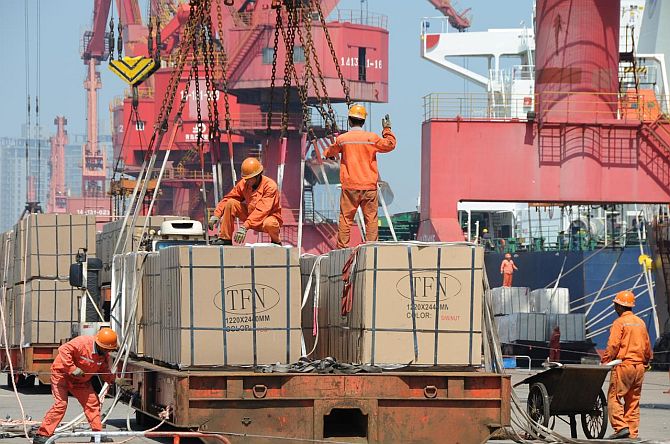
New Delhi, Dec 18 (PTI) India's exports worth USD 775 million to the UK may be impacted due to Britain's decision to introduce carbon tax on products such as iron and steel, aluminium, fertiliser and cement, from 2027, economic think tank GTRI said on Monday.
The UK government on December 18 decided to implement its Carbon Border Adjustment Mechanism (CBAM) starting 2027, according to the Global Trade Research Initiative (GTRI) report.
It said the UK calls it the import carbon pricing mechanism. The CBAM will initially focus on sectors like iron, steel, aluminum, fertiliser, hydrogen, ceramics, glass, and cement.
The UK, after the European Union (EU), will be the second economy to implement CBAM. Britain will soon work out detailed rules of the scheme, but it will in principle follow the EU model.
"Indian exports to the UK of value USD 775 million may attract CBAM tax in the UK starting 2027. The value of specific exports like iron, steel (USD 565.7 million), aluminum (USD 101.5 million), ceramics (82.8 million), and glass (USD 25 million), totalled at USD 775.3 million for FY23, representing 6.8 per cent of the total exports (to the UK) subject to CBAM," GTRI Co-Founder Ajay Srivastava said.
Exports of these goods in 2021-22 was about USD 995 million.
The tax could range from 14-24 per cent of the import value on full phase-out of free allowances under the ETS (Emission Trading System).
The rates have been calculated considering emission intensities the current UK ETS prices. For the EU, tax range is 20-35 per cent.
"The UK CBAM aims to prevent carbon leakage. Carbon leakage is the phenomenon of companies moving production to countries with weaker environmental regulations to avoid paying carbon prices in the UK. Thus, the main aim is to ensure imports are subject to the same rate of carbon tax as the UK producers pay through UK's Emission Trading System (ETS)," he said.
He added that by doing so, the UK government hopes to provide fair competition for its domestic manufacturers and ensure that its decarbonisation efforts contribute to a real reduction in global emissions.
The GTRI report said the tax will be calculated based on the estimated carbon emissions involved in the production of these imported goods.
Countries with carbon pricing schemes equivalent to the UK's will be exempt from this tax.
Both the UK and the EU have implemented ETS to cap and reduce greenhouse gas emissions.
These systems work by setting a limit on the total amount of carbon emissions allowed and then issuing permits to emitters.
"Companies must purchase permits for each ton of carbon they emit, and the price of these permits is determined by supply and demand. The CBAM will work in conjunction with the UK ETS.
"The ETS Authority is currently consulting on how to better target free allocations of carbon allowances and is considering the design of a new Supply Adjustment Mechanism to enhance the scheme's effectiveness," it added.
It also said the UK CBAM follows the EU model. However, the UK is also considering implementing voluntary product standards and developing a framework to measure the carbon content of goods.
These initiatives are aimed at promoting low-carbon products and supporting other decarbonization policies.
The UK government on December 18 decided to implement its Carbon Border Adjustment Mechanism (CBAM) starting 2027, according to the Global Trade Research Initiative (GTRI) report.
It said the UK calls it the import carbon pricing mechanism. The CBAM will initially focus on sectors like iron, steel, aluminum, fertiliser, hydrogen, ceramics, glass, and cement.
The UK, after the European Union (EU), will be the second economy to implement CBAM. Britain will soon work out detailed rules of the scheme, but it will in principle follow the EU model.
"Indian exports to the UK of value USD 775 million may attract CBAM tax in the UK starting 2027. The value of specific exports like iron, steel (USD 565.7 million), aluminum (USD 101.5 million), ceramics (82.8 million), and glass (USD 25 million), totalled at USD 775.3 million for FY23, representing 6.8 per cent of the total exports (to the UK) subject to CBAM," GTRI Co-Founder Ajay Srivastava said.
Exports of these goods in 2021-22 was about USD 995 million.
The tax could range from 14-24 per cent of the import value on full phase-out of free allowances under the ETS (Emission Trading System).
The rates have been calculated considering emission intensities the current UK ETS prices. For the EU, tax range is 20-35 per cent.
"The UK CBAM aims to prevent carbon leakage. Carbon leakage is the phenomenon of companies moving production to countries with weaker environmental regulations to avoid paying carbon prices in the UK. Thus, the main aim is to ensure imports are subject to the same rate of carbon tax as the UK producers pay through UK's Emission Trading System (ETS)," he said.
He added that by doing so, the UK government hopes to provide fair competition for its domestic manufacturers and ensure that its decarbonisation efforts contribute to a real reduction in global emissions.
The GTRI report said the tax will be calculated based on the estimated carbon emissions involved in the production of these imported goods.
Countries with carbon pricing schemes equivalent to the UK's will be exempt from this tax.
Both the UK and the EU have implemented ETS to cap and reduce greenhouse gas emissions.
These systems work by setting a limit on the total amount of carbon emissions allowed and then issuing permits to emitters.
"Companies must purchase permits for each ton of carbon they emit, and the price of these permits is determined by supply and demand. The CBAM will work in conjunction with the UK ETS.
"The ETS Authority is currently consulting on how to better target free allocations of carbon allowances and is considering the design of a new Supply Adjustment Mechanism to enhance the scheme's effectiveness," it added.
It also said the UK CBAM follows the EU model. However, the UK is also considering implementing voluntary product standards and developing a framework to measure the carbon content of goods.
These initiatives are aimed at promoting low-carbon products and supporting other decarbonization policies.
Read More On:
DISCLAIMER - This article is from a syndicated feed. The original source is responsible for accuracy, views & content ownership. Views expressed may not reflect those of rediff.com India Limited.
You May Like To Read
TODAY'S MOST TRADED COMPANIES
- Company Name
- Price
- Volume
- GTL Infrastructure
- 2.93 ( -4.87)
- 226206286
- IFL Enterprises
- 1.30 (+ 4.84)
- 81461564
- Vodafone Idea L
- 16.79 (+ 0.66)
- 67447398
- NCL Research
- 0.95 ( -4.04)
- 31996628
- Franklin Industries
- 3.73 (+ 3.32)
- 21511209
MORE NEWS

Navi Mumbai Airport ILS Signal Testing Begins
The Airports Authority of India (AAI) has begun ILS signal testing at the...

Air India VRS for Non-Flying Staff Ahead of...
Air India has announced a voluntary retirement scheme (VRS) and voluntary separation...
Fisher Groups Oppose WTO Fisheries Subsidy Talks
Small-scale fisher groups from India, Indonesia, and Bangladesh demand WTO keep...



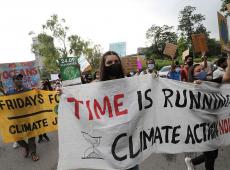
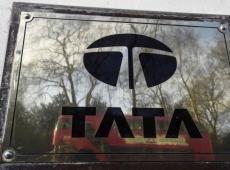
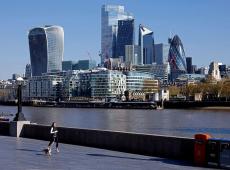



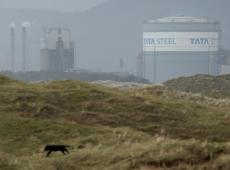
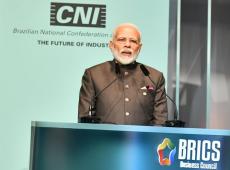

 © 2024 Rediff.com India Limited. All rights reserved.
© 2024 Rediff.com India Limited. All rights reserved.